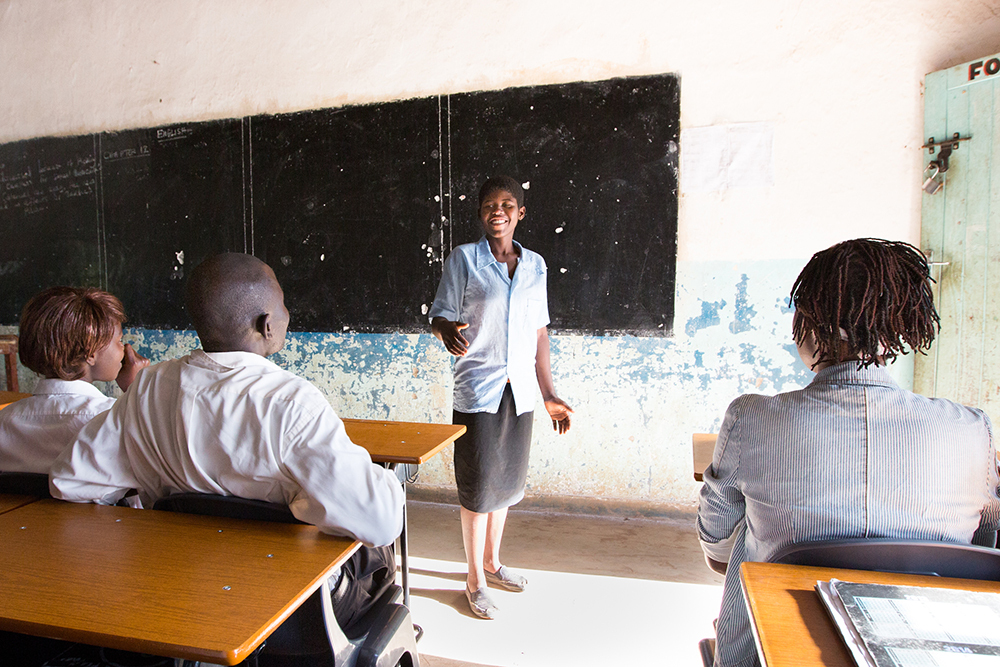For International Women’s Day, we share an interview with Secret John, a young mother in Malawi who is helping to empower other teens through peer education. While a secondary school student, Secret faced the double challenge of coping with HIV and becoming a teen mother. Fortunately, she was set up with HIV treatment though Grassroots Movement for Health and Development (GMHD), a community-based organization supported by the Elizabeth Glaser Pediatric AIDS Foundation (EGPAF) and ViiV Healthcare. By following prevention of mother-to-child transmission of HIV (PMTCT) protocols, Secret is now raising an HIV-free toddler.
The shock of Secret’s situation motivated her to help friends avoid such risk and responsibility. To reach other girls needing sexual and reproductive information and support, Secret volunteered to be trained as a peer educator by GMHD. At a young age, Secret is already leading an effort in her community to end AIDS in children and to keep their mothers healthy.
My name is Secret John, and at 17 years old I’m already a mother. I started working as a peer educator three months into my pregnancy.
Though I managed to hide my pregnancy when I first started as a peer educator, I soon began to show. I faced considerable stigma from my friends. Though I had wanted to abort at first, I quickly understood that this could only be done illegally and that there were a lot of risks involved. I was anxious to share this knowledge with other young women and girls before they found themselves in a similar position, and to make sure that as many as possible understood the dangers of unprotected sex and what they could do to prevent teenage pregnancy.
I myself had not had the good fortune of exposure to the sort of knowledge that peer educators impart. Before I conceived, my knowledge of contraceptives was muddied by the fact that there were a lot of myths floating around about how family planning methods could permanently affect my ability to bear children. I remember clearly what I went through, and would not want other young people to face such experiences alone.
The training and information sharing that I undertake with my peers happens in various ways. We have one-to-one sessions, where I approach young people and counsel them personally, and I lead group discussions, where people can speak freely about the stigma they are facing and how they are coping. In both types of interaction, I also talk about PMTCT and how one can undertake family planning.
My peers have a lot of questions, which I do my best to answer. Secret John, a young peer educator in Malawi
Often, the abuse I got at school [because of my HIV status and pregnancy] would be constant, and I would have to leave for the day. However, I always strived to find the strength within me to come back with my head held high. This has helped me to encourage other girls to recognize the value of staying in education long-term, even if they experience similar circumstances to mine.
I also speak to them about contraception and how they can take preventive measures if they do have sex at this young age. GMHD has encouraged me to distribute condoms as part of this role. My peers often approach me with a lot of hesitation, so I try to encourage them to relax and do my best to provide them with the clearest information possible to ensure they can stay safe and not get pregnant.
When girls get pregnant, my main aim is to encourage them to immediately go to the local health center. I also inform them about how they were vulnerable to sexually transmitted infections [like HIV] when they had sex, pointing out that if they don’t get tested early then they run the risk of the child’s infection as well.
I was drawn to this role because, as mother-to-be, I was keen to acquire the skills, knowledge, and awareness to be a role model to other young people in the future and give back to my community.

International Women’s Day celebrates the social, economic, cultural, and political achievement of women. Across the world, ordinary women stand on the front lines of the battle to end AIDS in children—as they adhere to PMTCT treatment and provide education and counseling to their peers.
The Elizabeth Glaser Pediatric AIDS Foundation (EGPAF) provides technical assistance to GMHD and other community-based organizations in Malawi with funding from ViiV Healthcare.




